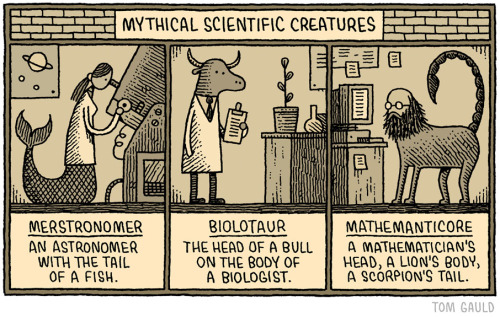"To awaken my spirit through hard work and dedicate my life to knowledge... What do you seek?"
229 posts
Latest Posts by theidlerhour - Page 6




Kung fu nuns of Nepal.
Via Pinterest

A recent cartoon for New Scientist.

Astronauts returning home from the ISS aboard a not so spacious Soyuz capsule
via reddit




T-42 days (October 23, 2015) - Cygnus being loaded with cargo
Cargo stowing began on the OA-4 mission earlier this week at the International Space Station Processing Facility. The enhanced Cygnus pressure vessel is now being loaded with nearly 7,700 pounds of cargo for the International Space Station. In the foreground of the last image, the service module for the spacecraft can be seen undergoing testing. It was delivered to Kennedy Space Center early last week. OA-4 is scheduled to launch at 6:03 pm EST on December 3, on an United Launch Alliance Atlas V 401 rocket. It will be the first of two Cygnus resupply missions to fly on the Atlas V, which is acting as an intermediate launch vehicle while Orbital ATK’s Antares rocket returns to flight.

fav japanese vine so far
in your opinion, what's going to happen when the physical properties of silicon can't sustain moore's law anymore
nothing, for two reasons
first some background: moore’s law states that every year the number of components (transistors) on integrated circuits will double (due to engineering breakthroughs). it has proved to be somewhat correct. it occurs due to our ability to manufacture smaller and smaller transistors which has a few effects, discussed later. eventually we will hit a point where it no longer matters how small we can print transistors as the fundamental electrical characteristics of silicon break down
in the next couple of years, we will see chips from intel with transistors printed about ten nanometers apart. we approach the limits silicon can handle, theoretically, around ~1nm
in circuits this small, you start seeing tunneling effects which are phenomenons of quantum physics wherein the propagation delay of charge falls to zero, meaning stimulation of the source terminal of a transistor would elicit a response on the drain terminal without any time elapsing. electrons just “blink” from one end of the xsistor to the other. you’d think this would be a good thing, but it isn’t. anyone with advanced physics degrees or deep VLSI knowlege is welcome to chime in why.
anyway
the first reason is there is no alternative to silicon. we have poured billions into researching things like gallium arsenide as a replacement for silicon in integrated circuits. it doesn’t work as well as silicon. people will try to convince you otherwise and those people are crackpots
we have poured a lot of time & money into researching quantum computers and discovered that they are only superior for very specific tasks such as brute-forcing encryption keys and other things of that nature. they will also probably never cost a billion dollars each to manufacture, never need anything less than a power plant and vats of liquid helium to operate, etc etc
the logical “next step” might be optical computing. here, you fundamentally change the hardware paradigm from electrons traveling through traces cut in a mediating silicon substrate between transistors to photons traveling through ?? mediated by ?? between “phototransistors”. the underlying principle is that light, in some cases, travels faster than voltage propagates through conductors. i’m going to get a lot of asks saying “durr kremlin but the speed of light is constant and i took high school physics and blah blah blah” and that’s a discussion worth its own post
this kind of tech is far off. not in our lifetime, not in your children’s lifetime, not in your children’s children’s lifetime
the reason we make transistors smaller is so we can pack them together more closely. this reduces the distance charge must travel in the circuit, making the cycles of these circuits take less time to complete. smaller transistors also generally necessitate less impedance and operate correctly at lower voltages, meaning their operating frequency can increase without a corresponding drop in reliability
these are all nice things, but they are only one piece of the puzzle. how you lay out these transistors is a much more critical and relevant problem. taking a previous VLSI design and shrinking it only works to a point after which you must redesign the layout entirely. intel’s “tick-tock” release/development department follows this model. long before and long after we hit the fundamental limits of silicon, the problem will be laying out our CPU circuits in such a way that we can actually eek out the performance provided by smaller transistors. this is a much, much harder problem to solve than “how do i make the transistor smaller”
the second, more pragmatic reason is that CPUs are fast enough already. there are scarce few problems that can be solved with faster discrete processors that can’t be solved with a million slower ones linked together
the whole tiny-transistor thing is really more of a marketing phenomenon than anything else

“What do you play?”
“The Clarinet, you?”
“I play the fucking HAMMER”




Willis A. Kropp, VIctor adding machine, 1942. Bakelite. USA. Via Cooper Hewitt
verklempt
(adjective) An untranslatable Yiddish word, verklempt is described as a person who is too emotional to speak. Verbalizing your emotions or the simple act of uttering a word become a challenge. (via wordsnquotes)
The study of the galaxies reveals a universal order and beauty. It also shows us chaotic violence on a scale hitherto undreamed of. That we live in a universe which permits life is remarkable. That we live in one which destroys galaxies and stars and worlds is also remarkable. The universe seems neither benign nor hostile, merely indifferent to the concerns of such puny creatures as we.
Carl Sagan, Cosmos (via vagogh)




Happy Back to the Future Day! We’re kind of obsessed with the future predictions found on these old cigarette cards from our Digital Collections. Imagine London being lit by a gigantic laser light contraption? Amazing.
See more here.

These “mammatus clouds” were photographed above Hastings, Nebraska, after a destructive thunderstorm in May 2005. Although their formation is not completely understood, these rare clouds usually develop at the base of a thunderstorm, and appear lumpy because of instabilities and temperature differences between sinking and rising air.
I wrote my way out of hell… I picked up a pen, I wrote my own deliverance.
“Hurricane,” Lin-Manuel Miranda (via freethepoets)
To Carthage then I came Burning burning burning burning
T.S. Eliot, from “The Waste Land” (via lifeinpoetry)





The fear of being found, Greg Ponthus
Books permit us to voyage through time, to tap the wisdom of our ancestors. The library connects us with the insight and knowledge, painfully extracted from Nature, of the greatest minds that ever were, with the best teachers, drawn from the entire planet and from all our history, to instruct us without tiring, and to inspire us to make our own contribution to the collective knowledge of the human species. I think the health of our civilization, the depth of our awareness about the underpinnings of our culture and our concern for the future can all be tested by how well we support our libraries.
Carl Sagan, Cosmos (via victoriousvocabulary)
I find everything poetic, and it’s in the corners of my heart which are sometimes mysterious that I catch a glimpse of poetry… I feel a sensation that leads me into a poetic state…
Paul Gauguin, “Letter to Vincent van Gogh,” 8 Sept. 1888 (via paulgauguin-art)
The pride
When your little sister can reiterate the jist of Millikan, Rutherford, and Daltons models of the atom.
“And then there was this oil, and these charged plates, and he shot xrays at it, and the drops floated…. ”
“And then there was this gold foil, real gold, and they shot it, and some of the particles shot back, and everyone was like, whoa….DENSELY PACKED NUCLEUS”
Physicists often quote from T. H. White’s epic novel The Once and Future King , where a society of ants declares, ‘Everything not forbidden is compulsory.’ In other words, if there isn’t a basic principle of physics forbidding time travel, then time travel is necessarily a physical possibility. (The reason for this is the uncertainty principle. Unless something is forbidden, quantum effects and fluctuations will eventually make it possible if we wait long enough. Thus, unless there is a law forbidding it, it will eventually occur.)
Michio Kaku

Just for your info, actually he’s talking (without quoting) about the Gell-Mann’s Totalitarian Principle:
“Everything not forbidden is compulsory.”
(via scienceisbeauty)

From Nick Knight’s tribute video to Lee Alexander McQueen















